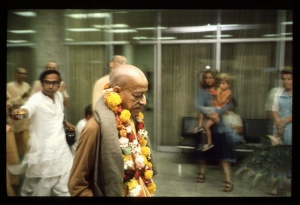CC Madhya 24.104 (1975)

A.C. Bhaktivedanta Swami Prabhupada
Below is the 1996 edition text, ready to be substituted with the 1975 one using the compile form.
TEXT 104
- sādhu-saṅga, kṛṣṇa-kṛpā, bhaktira svabhāva
- e tine saba chāḍāya, kare kṛṣṇe ‘bhāva’
SYNONYMS
sādhu-saṅga—the association of devotees; kṛṣṇa-kṛpā—the mercy of Lord Kṛṣṇa; bhaktira—of devotional service; svabhāva—nature; e tine—these three; saba chāḍāya—cause one to give up everything else; kare—do; kṛṣṇe—unto Lord Kṛṣṇa; bhāva—the loving affairs.
TRANSLATION
“Association with a devotee, the mercy of Kṛṣṇa, and the nature of devotional service help one to give up all undesirable association and gradually attain elevation to the platform of love of Godhead.
PURPORT
This verse refers to the association of pure devotees, the mercy of Kṛṣṇa and the rendering of devotional service. All these help one give up the association of nondevotees and the material opulence awarded by the external energy, māyā. A pure devotee is never attracted by material opulence, for he understands that wasting time to acquire material opulence is a misuse of the gift of human life. In Śrīmad-Bhāgavatam it is said, śrama eva hi kevalam (SB 1.2.8). In the eyes of a devotee, politicians, social workers, philanthropists, philosophers and humanitarians are simply wasting their time, for human society is not freed from the cycle of birth and death by their activity and propaganda. These so-called philanthropists, politicians and philosophers have no knowledge because they do not know that there is life after death. Understanding that there is life after death is the beginning of spiritual knowledge. A person can understand himself and what he is simply by understanding the first lessons of the Bhagavad-gītā (BG 2.13):
- dehino ‘smin yathā dehe kaumāraṁ yauvanaṁ jarā
- tathā dehāntara-prāptir dhīras tatra na muhyati
“As the embodied soul continuously passes, in this body, from boyhood to youth to old age, the soul similarly passes into another body at death. A sober person is not bewildered by such a change.” Not knowing the real science of life, a foolish person engages in the temporary activities of this life and thus becomes further entangled in the cycle of birth and death. He always desires material opulence, which can be attained by karma, jñāna and yoga. But when one is actually elevated to the devotional platform, he gives up all these desires. This is called anyābhilāṣitā-śūnya. Then one becomes a pure devotee.